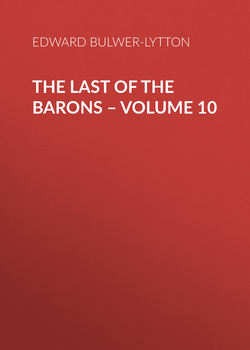Читать книгу The Last of the Barons – Volume 10 - Эдвард Джордж Бульвер-Литтон, Эдвард Бульвер-Литтон - Страница 4
BOOK X.
THE RETURN OF THE KING-MAKER
CHAPTER IV.
THE STRIFE WHICH SIBYLL HAD COURTED, BETWEEN KATHERINE AND HERSELF, COMMENCES IN SERIOUS EARNEST
ОглавлениеHastings felt relieved when, the next day, several couriers arrived with tidings so important as to merge all considerations into those of state. A secret messenger from the French court threw Gloucester into one of those convulsive passions of rage, to which, with all his intellect and dissimulation, he was sometimes subject, by the news of Anne's betrothal to Prince Edward; nor did the letter from Clarence to the king, attesting the success of one of his schemes, comfort Richard for the failure of the other. A letter from Burgundy confirmed the report of the spy, announced Duke Charles's intention of sending a fleet to prevent Warwick's invasion, and rated King Edward sharply for his supineness in not preparing suitably against so formidable a foe. The gay and reckless presumption of Edward, worthier of a knight- errant than a monarch, laughed at the word invasion. "Pest on Burgundy's ships! I only wish that the earl would land!" [Com, iii. c. 5] he said to his council. None echoed the wish! But later in the day came a third messenger with information that roused all Edward's ire; careless of each danger in the distance, he ever sprang into energy and vengeance when a foe was already in the field. And the Lord Fitzhugh (the young nobleman before seen among the rebels at Olney, and who had now succeeded to the honours of his House) had suddenly risen in the North, at the head of a formidable rebellion. No man had so large an experience in the warfare of those districts, the temper of the people, and the inclinations of the various towns and lordships as Montagu; he was the natural chief to depute against the rebels. Some animated discussion took place as to the dependence to be placed in the marquis at such a crisis; but while the more wary held it safer, at all hazards, not to leave him unemployed, and to command his services in an expedition that would remove him from the neighbourhood of his brother, should the latter land, as was expected, on the coast of Norfolk, Edward, with a blindness of conceit that seems almost incredible, believed firmly in the infatuated loyalty of the man whom he had slighted and impoverished, and whom, by his offer of his daughter to the Lancastrian prince, he had yet more recently cozened and deluded. Montagu was hastily summoned, and received orders to march at once to the North, levy forces, and assume their command. The marquis obeyed with fewer words than were natural to him, left the presence, sprang on his horse, and as he rode from the palace, drew a letter from his bosom. "Ah, Edward," said he, setting his teeth, "so, after the solemn betrothal of thy daughter to my son, thou wouldst have given her to thy Lancastrian enemy. Coward, to bribe his peace! recreant, to belie thy word! I thank thee for this news, Warwick; for without that injury I feel I could never, when the hour came, have drawn sword against this faithless man,—especially for Lancaster. Ay, tremble, thou who deridest all truth and honour! He who himself betrays, cannot call vengeance treason!"
Meanwhile, Edward departed, for further preparations, to the Tower of London. New evidences of the mine beneath his feet here awaited the incredulous king. On the door of St. Paul's, of many of the metropolitan churches, on the Standard at Chepe, and on London Bridge, during the past night, had been affixed, none knew by whom, the celebrated proclamation, signed by Warwick and Clarence (drawn up in the bold style of the earl), announcing their speedy return, containing a brief and vigorous description of the misrule of the realm, and their determination to reform all evils and redress all wrongs. [See, for this proclamation, Ellis's "Original Letters," vol. i., second series, letter 42.] Though the proclamation named not the restoration of the Lancastrian line (doubtless from regard for Henry's safety), all men in the metropolis were already aware of the formidable league between Margaret and Warwick. Yet, even still, Edward smiled in contempt, for he had faith in the letter received from Clarence, and felt assured that the moment the duke and the earl landed, the former would betray his companion stealthily to the king; so, despite all these exciting subjects of grave alarm, the nightly banquet at the Tower was never merrier and more joyous. Hastings left the feast ere it deepened into revel, and, absorbed in various and profound contemplation, entered his apartment. He threw himself on a seat, and leaned his face on his hands.
